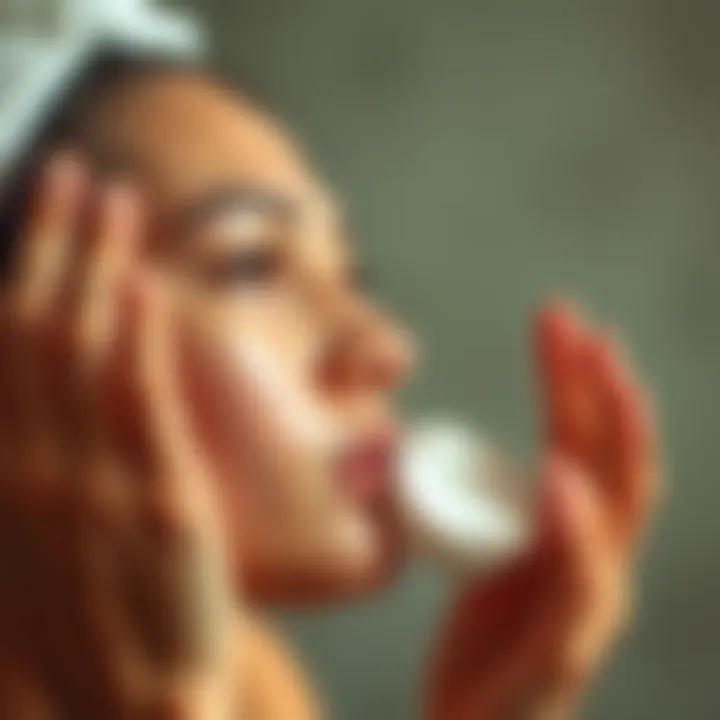Effective Morning Cleansers for Acne-Prone Skin


Well-Being Overview
Preamble to the topic
Managing acne can often feel like a battle fought on various fronts, and morning skincare routines play a crucial role in this fight. While acne can affect people of all ages, understanding the right products and techniques for your skin type is essential. Morning cleansers serve as a foundational step in any skincare regime, especially for those with acne-prone skin.
This guide will delve into the importance of morning cleansers, unpack the ingredients that work wonders, and provide insights into how these products can be utilized effectively.
Importance of focusing on this aspect of well-being
When it comes to self-care, the skin often stands front and center, and for good reason. Our skin not only acts as a barrier against environmental challenges but also reflects our overall health. Choosing the right morning cleanser can help soothe irritation and prevent further breakouts, which in turn may boost confidence and emotional well-being.
"A good skincare routine is not just about vanity; it’s about taking care of yourself from the outside in."
Understanding the significance of cleansers specifically designed for acne-prone skin can lighten the load of everyday stress related to appearance. Furthermore, incorporating effective products into your routine is another way of practicing self-appreciation. This comprehensive guide aims to support health professionals, wellness coaches, and skincare enthusiasts in making informed decisions about morning cleansers that truly benefit the skin's health.
Understanding Acne-Prone Skin
Acne is more than just a fleeting skin annoyance; it can profoundly affect an individual’s self-esteem and overall mental well-being. For those who find themselves grappling with acne, understanding the nature of their skin is crucial. When one comprehends their skin's unique characteristics and triggers, they lay the groundwork for an effective skincare regimen that includes appropriate cleansing products. This segment zeroes in on the fundamentals of acne-prone skin, providing insights into what constitutes this condition, common causes that might exacerbate it, and how different skin types can influence the presentation of acne.
Definition and Characteristics
Acne-prone skin is often defined by a propensity for breakouts, which may include blackheads, whiteheads, cysts, and pustules. Typically, this skin type is characterized by excess sebum production, clogged pores, and inflammation. The visible signs can manifest in various ways:
- Oily skin with a shiny appearance, particularly in the T-zone (forehead, nose, and chin)
- Clogged pores that can lead to blackheads or whiteheads
- Red and inflamed patches, indicating active breakouts
Understanding these traits is important. Recognizing that your skin produces too much oil or that your pores are easily clogged informs the decisions you make regarding skincare products and routines.
Common Causes of Acne
Several factors play a role in the development of acne-prone skin. Among the most commonly cited causes are:
- Hormonal fluctuations: Particularly during puberty, menstruation, or pregnancy, these changes can lead to increased oil production.
- Dietary choices: Some individuals might find that certain foods, particularly those high in glycemic index or dairy, can trigger breakouts.
- Stress levels: Stress can heighten the production of hormones like cortisol, which in turn increases oil production in the skin.
- Skincare products: The wrong combination might lead to clogged pores. It’s vital to choose non-comedogenic products specifically designed for acne-prone skin.
By grasping these factors, individuals are better equipped to identify potential irritants and avoid practices that could worsen their acne conditions.
Skin Types and Their Impact
Understanding one’s specific skin type is integral to managing acne. Different skin types react to products and stimuli in various ways. For instance:
- Oily skin tends to be more susceptible to breakouts. While this may require more frequent cleansing, care must be taken not to strip away essential moisture, which can paradoxically lead to more oil production.
- Dry skin may also experience acne, although it typically presents as small bumps rather than cystic lesions. This skin type necessitates gentle cleansing and ample hydration to avoid exacerbating irritation.
More complex scenarios, such as combination skin, also exist. Individuals with combination skin may face challenges because different areas require varied care approaches.
By recognizing how skin type influences acne, people can make informed choices about their morning cleansing routine. Understanding these insights encourages tailored skincare approaches and promotes better outcomes in managing acne-prone conditions.
"Knowledge is power when it comes to skincare; understanding your skin is the first step to effective treatment."
This deeper understanding not only aids in the selection of appropriate products but also fosters a holistic approach to skincare, incorporating various aspects such as diet and stress management.
The Importance of Cleansing
Cleansing is more than just a step in your daily skincare routine; it's the foundation for healthy skin. The act of cleansing helps remove dirt, oil, makeup, and impurities that accumulate on the skin's surface overnight. For individuals with acne-prone skin, this step is even more critical. A proper cleansing routine sets the stage for other products to work effectively. Without cleansing, treatments for acne may struggle to penetrate the skin and bring about the desired results.
In the morning, the skin can often feel greasy or a bit grimy, thanks to the natural oils that the skin produces overnight. This oil can latch onto any dirt or debris, creating a breeding ground for bacteria that exacerbate acne. Cleansing in the morning is essential to eliminate these accumulated impurities, providing a fresh canvas for your other skincare products. Therefore, coming fresh-faced into your day can help promote better skin health.
Role of Cleansers in Skincare
Cleansers are the unsung heroes of skincare. They serve not just to remove impurities but also to prepare your skin for hydration and treatment. Different cleansers work in unique ways: some can break down excess oil, while others can exfoliate dead skin cells. When selecting a cleanser, consider what your skin truly needs.
- Hydrating Cleansers: Ideal for dry or sensitive skin types, they help maintain moisture levels.
- Exfoliating Cleansers: These cleansers often contain ingredients like glycolic acid, which can slough off dead skin cells, preventing clogged pores.
- Foaming Cleansers: Typically favored for oily skin, these remove excess oil efficiently.
The right cleanser can significantly impact skin health by lowering the chances of breakouts and irritating reactions.
Morning vs. Night Cleansing
While cleansing at night removes the day's grime, morning cleansing has its unique importance. At night, skin protection is key. During sleep, the skin enters a repair mode, and the natural oils produced help create a barrier and maintain hydration. So, why cleanse in the morning?
- Oil Regulation: As mentioned earlier, oil production can ramp up during the night. Cleansing in the morning helps manage excess oil without stripping your skin's barrier.
- Bacteria Control: Overnight, your skin can become a hub for bacteria. Morning cleansing helps disrupt this potential breakout factor, enhancing your skin's natural defense against impurities.
- Increased Efficacy of Products: After thoroughly cleansing, any serums or treatments applied will absorb better.
It is crucial, however, to choose a gentle cleanser in the morning to avoid irritating the skin, especially for those dealing with acne.


How Cleansers Help Manage Acne
Using the right cleanser is a proactive measure in managing acne. Cleansers formulated with specific ingredients, such as salicylic acid or benzoyl peroxide, can help reduce the appearance of acne in several ways:
- Deep Cleaning Pores: Ingredients like salicylic acid penetrate the pores, helping to unclog them and reduce formation of new acne spots.
- Excess Oil Control: Cleansers that contain components to absorb or remove excess oil help mitigate the formation of acne.
- Bacterial Management: Ingredients like benzoyl peroxide are known for their antibacterial properties, aiding in reducing acne-causing bacteria on the skin's surface.
The effectiveness of a cleanser hinges on its formulation. Thus, understanding how specific ingredients work helps in choosing the right product for acne management.
"The right cleanser is like having the right partner at a dance; it sets the pace for everything that follows."
By investing time in understanding the importance of cleansing, individuals take the first step toward achieving healthier skin.
Choosing the Right Morning Cleanser
Choosing the right morning cleanser is paramount for anyone dealing with acne-prone skin. It sets the tone for your skincare routine and can be a game-changer in how your skin responds to treatments throughout the day. Using a cleanser that tackles the specific needs of oily and acne-affected skin can help reduce breakouts, balance the skin's natural oil production, and create a fresh canvas for subsequent products. This section will delve into essential ingredients, harmful substances to avoid, and formulation considerations, providing you with the knowledge needed to make an informed choice.
Key Ingredients to Look For
Salicylic Acid
Salicylic acid is a standout in the realm of acne treatment. As a beta hydroxy acid, it possesses exfoliating properties that help unclog pores and clear out excess sebum, which is vital for acne prevention. Its oil-soluble nature allows it to penetrate deeper into the skin, effectively breaking down the dead skin cells that often lead to blemishes.
One of the key characteristics of salicylic acid is its ability to reduce inflammation, giving it an edge in calming existing breakouts. This compound has become a go-to ingredient and is often found in many acne-focused products due to its effectiveness and relatively low irritation potential, making it suitable even for some sensitive skin types. However, over-usage can lead to dryness, so it's best to find a balanced formulation.
Benzoyl Peroxide
Benzoyl peroxide is another heavy hitter in the fight against acne. It aggressively targets the bacteria that cause acne, specifically Propionibacterium acnes, effectively reducing both the quantity of these bacteria and the inflammation associated with acne breakouts.
The unique quality of benzoyl peroxide is its dual action of killing the bacteria while also helping to exfoliate the skin. This ingredient can clear blocked pores and prevent new spots from forming. However, while it can be incredibly beneficial, it is crucial to apply benzoyl peroxide judiciously, as it may cause significant dryness and irritation in some individuals. Finding a cleanser with a lower concentration tailored to your skin sensitivity may work better, ensuring you reap the benefits without causing additional issues.
Tea Tree Oil
Tea tree oil has risen in popularity, chiefly due to its gentle yet potent antibacterial properties. Known for its natural origins, this essential oil can be particularly appealing for those seeking less synthetic options in their skincare products. Tea tree oil works by reducing the growth of bacteria on the skin, which can reduce acne flare-ups over time.
Additionally, its natural anti-inflammatory effects can help soothe red, inflamed skin. The unique feature about tea tree oil is its multifaceted approach; it not only combats acne-causing bacteria but also has properties that can calm irritation. However, care must be taken as it can be irritating for some people if used in high concentrations, so opting for formulations that balance this active ingredient is key for optimal results.
Glycolic Acid
Glycolic acid is recognized for its exfoliating powers. Being an alpha hydroxy acid, it works on the surface of the skin to slough away dead skin cells, thereby preventing clogged pores and promoting a brighter, more even skin tone. This ingredient also aids in cellular turnover, which can significantly help in diminishing acne scars.
The primary characteristic of glycolic acid is its small molecular size that allows for deeper penetration into the skin. This makes it quite effective, but it also means that the potential for irritation is higher, especially in sensitive skin types. Incorporating glycolic acid into a cleanser should be approached carefully, ensuring that the formulation is properly balanced with moisturizing ingredients to mitigate any drying effects.
Avoiding Harmful Ingredients
Alcohol
Alcohol is often used in skin care products for its ability to create a cool sensation and reduce excess oil. However, for acne-prone skin, alcohol can be harsh and drying. It strips the skin of its natural oils, leading to a rebound effect where the skin produces even more oil, exacerbating acne issues. Using alcohol-free cleansers is a wise strategy to maintain the skin’s essential moisture and ward off irritation.
Sulfates
Sulfates are primarily functional as cleansing agents that create a lather, but they are often too harsh for sensitive skin, especially for those with acne. Common sulfates like sodium lauryl sulfate can disrupt the skin barrier, potentially leading to redness and irritation. It’s advisable to look for sulfate-free cleansers that offer gentler cleansing without stripping the skin.
Fragrances
Synthetic fragrances can irritate the skin and potentially aggravate acne conditions. Many products boast enticing scents, but with acne-prone skin, it's better to choose fragrance-free options. Fragrance-free products decrease the likelihood of any allergic reactions or sensitivities, making them safer for daily use.
Formulation Considerations
Foam-Based Cleansers
Foam-based cleansers can be effective for removing excess oil without leaving a residue. Many people are drawn to the luxurious lather and clean feeling that foam provides. However, depending on the formulation, some can be overly drying. A gentle foam cleanser with acne-fighting ingredients can effectively cleanse without stripping the skin.
Gels vs Creams
Gel-based cleansers are often light and refreshing, making them a popular choice for oily and acne-prone skin. They can provide a feeling of deep cleaning without the heaviness that cream formulas may have. On the other hand, cream cleansers can offer hydration, but they may be too rich for individuals with significant oil production. It’s crucial to identify which of these formulations better suits your skin type during the morning routine.
Micellar Waters
Micellar waters can serve as a mild cleansing option for acne-prone skin. They work by using micelles to lift grime and oil from the skin without harsh rubbing. This makes them particularly appealing for sensitive skin. While micellar waters can be great for a quick cleanse, they may not be enough for a thorough clean, especially if heavier products were used overnight.
Choosing the right morning cleanser involves recognizing your skin’s unique needs and understanding how different ingredients and formulations will impact your skin’s health. A combination of knowledge about beneficial ingredients, awareness of harmful additives, and an evaluation of product formats can position you for success in your quest for clearer skin.


Techniques for Effective Cleansing
Effective cleansing is more than just sudsing up with any product; it’s about establishing a routine that addresses the specific needs of acne-prone skin. By understanding the techniques involved, individuals can harness the full potential of their morning cleaning regimen. The right techniques not only help in removing dirt and oil but also prepare the skin for subsequent treatments. This chapter lays out well-thought steps that are essential for a proper cleansing routine, which in turn can significantly impact the overall health of the skin.
Step-by-Step Cleansing Routine
Preparing Your Skin
Preparation is key in any successful endeavor, and cleansing is no exception. Before diving into the specifics of any cleanser, prepping the skin serves to enhance the effectiveness of the product being utilized. A significant part of this stage is to allow the skin to be damp; dampness can help to open up pores, allowing the cleanser to penetrate deeper. Another vital aspect is to remove any superficial debris, like makeup or excess oil, which could interfere with the cleansing process.
Consider using a gentle wipe or a splash of lukewarm water to ensure the skin is ready for the cleanser. This step isn't just a formality; it can greatly enhance the benefits of the subsequent application, making it a widely recommended choice for acne-prone individuals to jumpstart their routine with a clean slate.
Application Methods
When it comes to applying cleanser, there are a variety of methods one might consider. Gently massaging the cleanser into the skin with fingertips creates a subtle friction that can help to dislodge impurities. Circular motions can also increase blood flow, which is beneficial in promoting healthier skin. Another effective method is using a soft washcloth or a brush, which not only aids in thorough cleansing but adds an exfoliating aspect to the routine.
However, it's essential to use such tools with care. Over-scrubbing can lead to irritation or exacerbate acne issues. Therefore, moderation and sensitivity to one’s skin response is crucial in this part of the cleansing process.
Rinsing Techniques
Rinsing is perhaps one of the most overlooked steps in the cleansing routine. It may sound simple, but the technique applied here can make a significant difference. Ideally, one should rinse with lukewarm water, as it is gentle and effective in removing all traces of cleanser without over-drying the skin. A common pitfall is rinsing with water that is too hot; this can strip the skin of essential oils and lead to dehydration, a counterproductive result for acne management.
The key here is to ensure that the cleanser is entirely washed away, preventing residue that could lead to clogged pores later on. Proper rinsing techniques emphasize achieving a clean feel without irritation, making it a critical consideration for anyone dealing with acne-prone skin.
Frequency of Cleansing
Finding the right balance in how often to cleanse is critical. Some may believe that cleansing multiple times a day will expedite improvement, but this may lead to more harm than good. Ideally, cleansing twice a day—once in the morning and once at night—is a widely accepted standard. Frequent cleansings can strip the skin’s natural oils, leading to a rebound effect where the skin produces even more oil, thus worsening acne.
Post-Cleansing Care
Moisturizers
Moisturizers are often seen as a contradiction by those with oily or acne-prone skin. However, the right moisturizer can do wonders, providing hydration without contributing to oiliness. Light, non-comedogenic formulas work best, keeping the skin supple after cleansing without clogging pores. The intent is to restore the moisture balance that cleansing may disrupt. Thus, it’s wise for individuals to choose products labeled for oily or acne-prone skin.
Sun Protection
After cleansing and moisturizing, applying sun protection is vital, especially for those using acne medications. Many of these treatments can make the skin more susceptible to sun damage. Hence, using a broad-spectrum sunscreen helps protect against harmful UVA/UVB rays while supporting healing processes. It’s advisable to opt for mineral-based sunscreens which are often gentler on the skin, making them a popular choice among individuals prone to acne.
Additional Treatments
Incorporating additional treatments afterward can enhance the overall skincare routine. Whether it’s a specific serum or spot treatment, applying these post-cleansing maximizes their efficacy by ensuring they reach clean skin for optimal absorption. Just like oils and treatments geared toward acne can frustrate if applied under make-up, their effectiveness is magnified in a clean environment, creating a synchronized step in a complete daily regimen.
Effective cleansing requires more than just a splash of soap; it involves careful preparation, application, and rinsing to promote overall skin health.
By meticulously following these techniques, individuals can empower themselves to combat acne more effectively while developing a routine that encourages healthy skin care practices.
Product Recommendations
When it comes to managing acne-prone skin, knowing which products to use can make the difference between a clear complexion and a breakout nightmare. Selecting the right morning cleanser is pivotal since it sets the stage for the day. Cleansing not only removes the oils and impurities accumulated overnight, but also primes the skin for subsequent treatments and hydration.
A good cleanser for acne-prone skin should align with the skin's unique needs, factoring in various elements such as ingredients, formulation, and skin sensitivity. Additionally, understanding the physiological aspects of acne helps in identifying products that can effectively mitigate breakouts. In this section, we will delve into specific product types tailored for different budgets while ensuring effectiveness and safety.
Top Cleansers for Acne-Prone Skin
Picking a cleanser often feels like searching for a needle in a haystack, especially with the myriad of products on the market. Here are a few highly regarded cleansers that have received positive feedback from both users and experts alike:
- CeraVe Renewing SA Cleanser: Infused with salicylic acid, this product gently exfoliates while also maintaining the skin’s moisture barrier, preventing dryness, which is essential in acne treatment.
- La Roche-Posay Effaclar Purifying Foaming Gel: This gel cleanser is free of harsh surfactants, making it gentle yet effective for daily use.
- Neutrogena Oil-Free Acne Wash: A classic in the skincare game, this formulation harnesses the power of benzoyl peroxide to fight acne while cleansing deeply.
- Bioré Charcoal Cleanser: Charcoal acts like a magnet, pulling out impurities. This deep-cleaning cleanser targets excess oil, making it popular among teens and adults alike.
Choosing a cleanser from trusted brands with proven ingredients can amplify your battle against acne.
Budget-Friendly Options
Don’t have deep pockets? No worries. The skincare aisle has plenty of wallet-friendly cleansers that pack a punch:
- Clean & Clear Essentials Foaming Facial Cleanser: This product is highly accessible and designed specifically for oily skin. Its formula helps remove dirt and oil effectively without breaking the bank.
- Cetaphil Daily Facial Cleanser: Although relatively inexpensive, it’s known for being gentle on the skin. It provides a thorough yet mild cleanse.
- AcneFree Oil Free Purifying Cleanser: This offers the benefits of benzoyl peroxide without the hefty price tag. It works well to manage acne without drying out the skin too much.
Keeping things economical doesn’t lead to compromising quality; rather, some hidden gems can be discovered in the budget-friendly section.
High-End Choices
For those willing to invest more in their skincare routine, high-end cleansers can offer advanced formulations or luxury experiences. Consider:


- SkinCeuticals Purifying Cleanser: A blend of botanicals and powerful ingredients helps to eliminate impurities while maintaining the skin’s natural moisture.
- Tatcha The Deep Cleanse: Featuring a gel texture infused with natural ingredients, this cleanser gently exfoliates the skin while keeping it hydrated.
- Drunk Elephant Beste No. 9 Jelly Cleanser: This luxurious option is praised for being effective yet non-stripping, making it ideal for use on sensitive, acne-prone skin.
While high-end cleansers might carry a steeper price tag, consumers often attest to their efficacy and often enhanced formulations that can provide additional benefits.
"Investing in quality skincare products can lead to long-term benefits, ultimately saving costs associated with treatment for skin issues down the line."
In summary, whether you're pinching pennies or splurging on luxury, there are plenty of morning cleansers that cater specifically to acne-prone skin. With the proper knowledge, making an informed choice can be less daunting and more empowering.
The Role of Lifestyle in Skin Health
Understanding the influence of lifestyle on skin health is pivotal for anyone striving to maintain a clear complexion, especially those battling acne. This section will explore the myriad elements that impact skin, illustrating how our daily choices—ranging from what we eat to how we cope with stress—shape the way our skin looks and feels. By recognizing these connections, readers can better tailor their skincare practices, maximize the benefits of morning cleansers, and ultimately pave the way for healthier skin.
Diet and Nutrition
Food plays a significant role in the maintenance of skin health. A well-balanced diet can either bolster skin resilience or contribute to breakouts. Incorporating a variety of fresh fruits and vegetables provides essential vitamins and minerals that nourish skin, such as:
- Vitamin A, found in carrots and sweet potatoes, which helps repair skin tissue.
- Omega-3 fatty acids, abundant in fish like salmon and walnuts, support the skin's barrier function, keeping it hydrated.
- Zinc from legumes and nuts aids in skin healing and reduces inflammation.
Conversely, certain food choices can trigger acne flare-ups. Dairy products and high-glycemic-index foods, like white bread and sugary snacks, often worsen skin conditions for some individuals. Observing how different foods affect personal skin can guide better dietary choices tailored to individual needs. A food diary might help clarify these relationships, making it easier to identify potential culprits behind those persistent breakouts.
Stress Management
Stress is often regarded as an undercurrent affecting overall health, but its impact on skin is especially profound. When stress levels rise, the body produces cortisol, a hormone that can lead to increased oil production and, consequently, acne. It can also result in behaviors that don’t help skin health, such as touching the face or neglecting skincare routines.
Implementing stress management techniques can be transformative. Simple activities like deep breathing, yoga, or even taking a moment to savor a cup of herbal tea can create a buffer against daily pressures. Moreover, regular exercise not only helps to relieve stress but also improves circulation, delivering more oxygen and nutrients to the skin. For a comprehensive approach, finding effective coping strategies—whether through mindfulness practices, creative outlets, or organized groups—can maintain emotional balance, ultimately benefiting skin health.
Environmental Factors
The environment surrounds us and profoundly influences our skin. Pollution, climate, and even seasonal changes can wreak havoc on acne-prone skin. Understanding these factors empowers individuals to make informed decisions about their skincare habits.
- Air pollution contains harmful particles that can penetrate the skin barrier, leading to oxidative stress and inflammation. Proper cleansing becomes even more critical in polluted areas.
- Humidity levels also play a role; overly dry air can strip moisture from the skin, making it more prone to irritation and breakouts, while excessive humidity can lead to clogged pores.
Taking steps to mitigate environmental impacts can significantly improve skin health. For instance, wearing non-comedogenic sunscreen daily not only protects against UV damage but also adds a layer of defense against pollutants. Regularly changing pillowcases and towels can avoid bacteria buildup, while investing in a humidifier might help if you live in a particularly dry climate.
Taking care of your skin starts from the inside out. Lifestyle changes often have a ripple effect, promoting better skin health in unexpected ways.
In summary, lifestyle choices significantly intersect with skin health. By focusing on nutritious eating, practicing stress management, and being mindful of environmental factors, individuals can create a solid foundation for effective morning cleansing routines. Armed with knowledge and practical strategies, anyone can take the reins of their skin’s health.
Common Myths About Acne and Cleansing
When dealing with acne, it’s easy to get swept up in a sea of advice, much of it conflicting. Myths about acne and cleansing persist, often leading individuals astray in their pursuit of clearer skin. Understanding which claims are fact and which are fiction is crucial for anyone with acne-prone skin. Clearing up these misconceptions not only helps in selecting proper products but also ensures that one's skincare routine is built on a solid foundation of truth.
Myth vs. Reality
One common myth is that washing your face more often leads to clearer skin. The logic seems straightforward: more cleansing means less oil and dirt, right? Wrong. Over-washing can actually strip the skin of its natural oils, leading to increased dryness and irritation. This dryness sometimes triggers the skin to produce even more oil, potentially worsening the acne rather than improving it.
Another widely held belief is that scrubbing your face vigorously will help eliminate acne. In reality, aggressive scrubbing can cause micro-tears in the skin, which might exacerbate irritation and lead to an increase in breakouts. Gentle cleansing is often far more beneficial, allowing the active ingredients in cleansers to work effectively without causing additional harm.
Debunking Misconceptions
Let’s address another popular misconception: that acne is solely caused by poor hygiene. While it’s true that dirty skin can contribute to breakouts, acne is a multifaceted condition influenced by various factors, including hormones, diet, and genetics. Relying solely on cleansing as a preventive measure oversimplifies the issue and may leave other underlying causes unaddressed.
Lastly, there is a belief that all acne-fighting products are suitable for everyone. This simply isn’t the case. Each person's skin responds differently to various ingredients. For example, products high in alcohol may be harsh and drying for some, while others might tolerate them well. It’s essential to tailor one’s skincare regimen to specific skin types and individual needs.
Important Insight: Poorly informed skincare choices can lead to more harm than good; understanding the facts can help individuals build an effective routine suited to their unique skin.
In summary, debunking myths about acne and cleansing is vital for achieving healthier skin. By distinguishing between myth and reality, individuals can make better decisions that improve their skin's condition rather than harm it.
Finale
In the realm of skincare, particularly for those steering through the challenges of acne-prone skin, the role of a morning cleanser cannot be overstated. This article successfully outlined the necessity of selecting the right cleanser as part of a broader skincare routine. Understanding your skin’s unique characteristics and identifying the right categories of ingredients is pivotal.
A morning cleanser does not simply wash away overnight impurities; it lays the groundwork for the day ahead. When employed regularly, a cleanser tailored for acne-prone skin not only clears blemishes but can also help in reducing sebum production and preventing future breakouts. The blend of the right ingredients such as salicylic acid or tea tree oil can play a significant role in maintaining skin health.
As emphasized throughout this guide, integrating a morning cleanser into your daily regimen holds substantial benefits. It's crucial to approach this task with knowledge; knowing which formulations interact well with your skin type can be the difference between thriving skin and ongoing irritation.
Ultimately, the importance of a cleansing routine extends beyond mere hygiene—it is an act of self-care and foresight in skin health management. The time spent in the morning to cleanse properly is investment in one’s confidence and well-being.
Recap of Key Points
- Morning cleansing is essential for acne-prone skin as it helps in removing impurities collected overnight, preparing the skin for the day.
- Choosing the right cleanser is imperative, with ingredients such as salicylic acid and tea tree oil being highly beneficial in fighting acne.
- Regular and effective cleansing can minimize future breakouts and aid in balancing skin oil levels.
- Understanding one's skin type and sensitivity is vital in selecting the appropriate product to avoid unnecessary irritation or adverse reactions.
Final Thoughts on Skincare Routine
Adhering to a consistent skincare routine that marries effective cleansing with complementary treatments is integral for those grappling with acne. A morning cleanser is just one piece of the puzzle. Pairing it with proper moisturization, targeted treatments, and sun protection will maximize results.
It’s not about how many products one uses but rather how well they work together. Keeping an eye on your skin’s responses over time will provide insights into what best suits your unique needs. Remember that a careful approach is not just a regimen, but a pathway to healthier skin and, ultimately, a more confident you.



